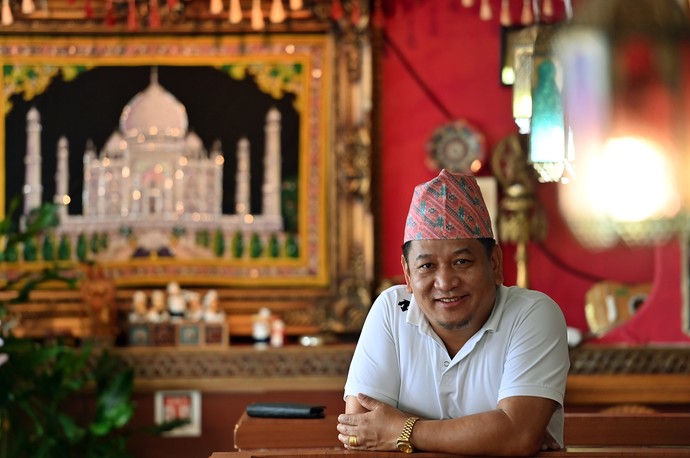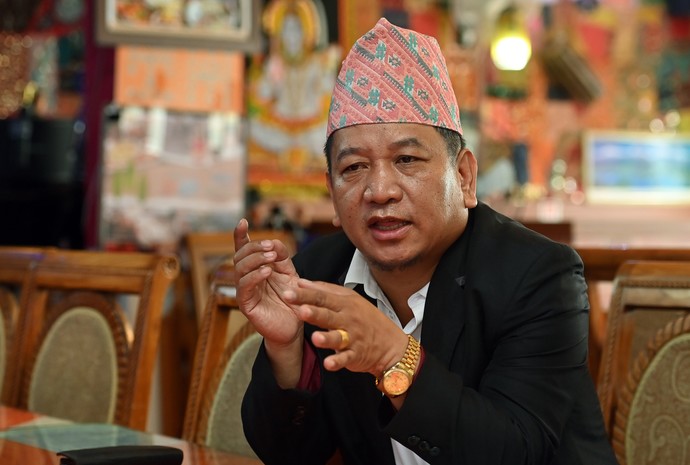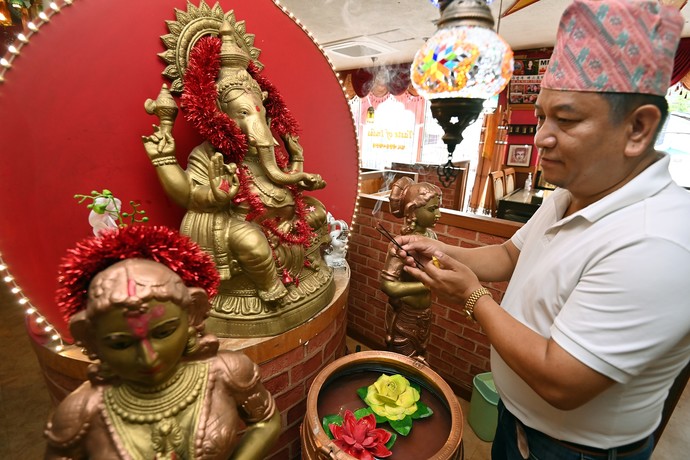[Multi-culture Story] Gurung’s 30 years in Korea: an Illegal foreign worker from Nepal to 4 restaurants’ owner
Korean society's perception of illegal immigrants is very bad. It is true that it causes many problems, such as the breakdown of social safety nets. Nevertheless, they are a necessary evil of our society in that our agriculture and industry cannot function properly even for a single day without the labor provided by illegal foreign workers. For better or worse, illegal immigrants play an important role in the labor force that supports the Korean industrial ecosystem.

Gurung(구릉 굽더 바하들/55) came to Korea in 1992 to earn money. The visa he had was a short-term travel visa. Life as an illegal foreign worker who no one welcomes has begun. He worked from factory to factory with the goal of living a little better. He normally worked 20 hours a day at a sewing factory. It was a series of days when he struggled to survive while receiving less than half a Korean salary. He had to endure the absurdity because he was an illegal immigrant.
Before coming to Korea, he was an ordinary Nepalese young man who was raised by his father, who was a teacher and lived without great difficulties. Why did a young man in his twenties come to Korea? What was the Korean dream for him? Joongbooilbo talked with him about his tumultuous life journey over the past 30 years in Korea
Q. Why did you decide to come to Korea?
When I was in Nepal, I had a lot of different jobs. I taught students and ran a restaurant and a supermarket. Due to that, I was able to have many opportunities to meet a variety of people. One day, I talked with a merchant who traveled to and from Nepal and abroad. I was tempted by his words that if I go to Korea, I could have a fun experience and earn a lot of money.
Compared to other houses in Nepal, our house was not poor. My father was working as a teacher. In the Joseon Dynasty, our house can be said to be a Yangban(part of the traditional ruling class during the Joseon Dynasty) family. But do you know what the characteristics of Yangbans are? They have land and a house, but no cash (laughs). The number of our siblings is six including myself and I am the eldest son. I came to Korea because I wanted to make money to help my parents.
Q. What did you do when you first came to Korea?
I came in with a short-term visa. With the visa, I couldn't stay in Korea for long and couldn't work. Actually, I am ashamed and embarrassed to say this to the media, but I was an illegal foreign worker.
The first place I went to after entering Korea was Cheongnyangni, Seoul. I knew very little about Korea at that time. I just went there because the merchant said there was a big hotel. While looking for a job around Cheongnyangni, I met the owner of a sewing factory. The owner suggest to me that if I work 8 to 9 hours a day, he will pay 450,000 won per month, I believe his words and started working at the sewing factory
It was too hard. And the owner’s promise was a lie. I worked 20 hours a day. There were times when I worked all night for about three days. I wished to get some good sleep. One day, I was so tired that I fell asleep in an empty space under the sewing machine. I heard later that the factory manager was furious because he thought I had run away. The factory is noisy and the space under the sewing machine is so narrow that he and other colleagues would never have imagined that a person would be sleeping in it.
The salary was also different from what was promised. He said he would pay 400,000 to 450,000 won a month. But when I checked my salary, I had only 240,000 won. I was frustrated and disappointed but there was nothing I could do. Because I was an illegal immigrant.
I thought that when this life would end every day. Farming is very difficult. It can be harder than factory work. But the farm work is over one day or other. They just have to work hard until the harvest. But working in this factory was like being in a dark tunnel with no end in sight. I stayed there for about a year and a half and moved to another factory.

Q. Have you been treated well in other factories?
After leaving the factory in Cheongnyangni, I got a job at another sewing factory in Jongam-dong, Seoul. I'm not proud of it, but I can say my ability to work was excellent (laughs). I knew how to run a sewing machine, cut and sewed well. I did the share of three. I received a higher salary than when I worked at the factory in Cheongnyangni. I remember getting around 700,000 won. After working there for about two years, I moved to another sewing factory in Wolgok-dong, Seoul. At the factory, I received a monthly salary of 1 million won. I felt that my skills were recognized. And I was comfortable with everyone around me like family. I worked there for about 4 years.
Q. Your salary has increased and you have been treated better, but you must have been worried about your status as an illegal immigrant.
What surprised me the most when I came to Korea was that there were so many police officers. Whether I went to the apartment or took a taxi or bus, the police were all there. It was a misunderstanding because taxi drivers, bus drivers, and apartment security guards were wearing uniforms that looked similar to police uniforms (laughs). I am talking about it like a joke now, but it is a huge loss from an individual's point of view to be repatriated to the home country after being discovered illegally. When illegal foreign workers came to Korea, they had already paid a lot of money for airfare, initial settling, and so on, but if they get kicked out before saving enough money, they might not recover the damage. As I said before, my circumstance was better than that of other foreigners who came to Korea to work, but I was always worried too. It has actually been caught. However, in the early 1990s, law enforcement against illegal immigrants was laxer than it is now. The manager of the factory I attended explained the situation to the police, and the police released me immediately.
Q. How did you start your business?
There were two reasons. At the end of 1997, when the IMF crisis broke out, the factory was hit economically. The salaries of employees have been cut by as little as 25% and as high as 50%. My salary was also cut by 25%. But one day, while talking to a male employee, I realized that not all employees had their wages cut. the male employee said it was unfortunate that the wages of female employees were cut in half. It turned out that only the female employees' wages and mine were reduced. I was the only foreigner in that factory. I didn't ask why at the time, but I'm still convinced that my salary was cut because I was a foreigner and an illegal immigrant.
I got married to a Korean woman. We gave birth to a baby in 1999. At that time, marriage to a foreigner was not viewed favorably. Many Koreans had a prejudice that foreigners won't make enough money. When I realized the bias, I said to my wife “When you earn 1 million won and 2 million won, I will earn 4 million won, and when you earn 4 million won, I will earn 40 million won.” and asked her to trust me.
As I was discriminated against because I was a foreigner and received negative views from people, I thought I had to make money and decided to start my own business. But there is a problem at that time. Since I was deported to Nepal after being found illegally staying.
Q. How were you able to return to Korea and conduct business after being deported?
As soon as I went to Nepal, I prepared to return to Korea. When I was deported to Nepal, my wife and daughter accompanied me. I registered my marriage in Nepal and got a new passport. Fortunately, I was lucky enough to get a marriage immigrant visa and come back to Korea.
After returning to Korea, I opened an imported mart in Dongdaemun selling Asian food materials and products. It was 2002. Since there are no Asian marts in each region as they are now, many people who want to purchase Asian food materials and products have to visit my market. I made a lot of money.
Many years have passed, and there are many stores selling Asian products in each region. The situation has come where people no longer have to come to Seoul to buy Asian ingredients or imported goods. After looking for other business items, I thought having a restaurant that caters to foreigners would be good. So I opened my first restaurant here in Suwon in 2007.

Q. Did business go well from the beginning?
I initially ran a restaurant for Nepali and foreign workers living around Suwon. Since the main customers are workers, there were many customers who came late at night after work. It was difficult to run the store until late. But I was lucky. In the late 2000s, eating foreign food started to be in fashion. In particular, as the number of bloggers increases, competition to upload unusual and unfamiliar foods also took place. Many media outlets also came to cover the matter. Due to that, my restaurant was promoted naturally, and a large number of Korean customers visit the mine. I expanded the business. I opened branches in large commercial areas such as Cheonan Station, Gangnam Sinsa Station, and Sogang University. Currently, I have four stores in Suwon, one in Gwangju, and two in Pyeongtaek.
Q. You seem to have good business acumen. Do you have a special management philosophy that you have while running a restaurant?
I think of a restaurant as a kind of hospital. I think that food can make people healthy and refresh them. If we only serve spicy and salty food, it will be evaluated as delicious. But will customers be able to eat our restaurant's food often? We are running the store with the mindset of serving delicious and healthy food even if it is not stimulating.
Q. Do you think you have achieved the Korean dream?
My Korean dream has not come true yet. If you ask me why it's because I always miss my family. I want to make my family happier, but it's still not enough. I want to spend more time with my parents and siblings in Nepal. I also want to help a lot of poor people in my hometown. Even now, I send rice to the poor in Nepal or pay for hospital expenses for the sick, but if I can afford it more financially, I would like to help more than I do now. That day will be the day my Korean dream comes true.
By Seyong Lee
